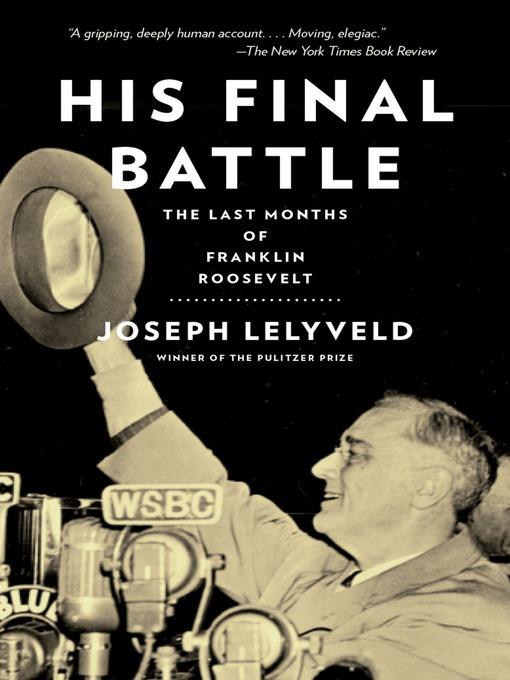
His Final Battle
The Last Months of Franklin Roosevelt
کتاب های مرتبط
- اطلاعات
- نقد و بررسی
- دیدگاه کاربران
نقد و بررسی

June 13, 2016
Lelyveld (Great Soul), winner of a 1986 Pulitzer Prize for Move Your Shadow, shows that there is much left to say about F.D.R. even though there is little left to learn of the main elements of his biography. Lelyveld’s approach is to focus on the last months of F.D.R.’s life and the influence of his declining health, always kept under wraps, on his decisions. The result is a gripping look into Roosevelt’s efforts to keep from both himself and the American people his severe hypertension and congestive heart failure during his successful fourth run for the presidency, as well as during the critical closing months of WWII. Lelyveld shows how others—national figures, family members, and the women who surrounded him—conspired to keep F.D.R.’s poor health a secret, and demonstrates that his doctors lacked either competence or candor. Yet those who saw him close up knew that his life was in danger. It didn’t help, as Lelyveld emphasizes, that F.D.R. was characteristically teasing and unrevealing about his thinking and intentions as well as his ailments. Though the consequences of the president’s illness might have been graver for the nation had he died even a few months prior, the U.S. survived while F.D.R. remained, as always, a sphinx, as he does to Lelyveld. This is a solid work of narrative history.

Starred review from July 1, 2016
Eloquently exposing the open secret of Franklin Roosevelt's advanced heart disease.Was FDR's decision to run for an unprecedented fourth term while in a state of such disastrous health foolhardy or inevitable? In this meticulous psychological study delineating FDR's crucial final acts as president--e.g., meeting Joseph Stalin for the first time in Tehran in November 1943, articulating the Four Freedoms, framing the United Nations, advocating for a democratic government in Poland, and winning the war--former New York Times executive editor and Pulitzer Prize-winning author Lelyveld (Great Soul: Mahatma Gandhi and His Struggle with India, 2011, etc.) portrays a melancholy, ailing president contemplating a fourth term as if "cornered" and resigned to seeing no alternative. The author asserts that FDR allowed himself to dream of resigning in his fourth term, yet there was simply too much at stake: the country would not let him go. The weight of the stress, however, was literally killing him, and despite the "roseate prognoses and testimonials" by his longtime physician, Ross McIntire, Lelyveld asserts that FDR "knew more than he let on" about the state of his heart, citing confidante Daisy Suckley's frank acknowledgements in her long-hidden diary. The truth would be confirmed by Navy cardiologist Howard G. Bruenn, who was finally summoned by FDR's worried daughter, Anna, in 1944. The author expertly puts together a string of poignant clues to FDR's last acts, as if he were acknowledging the need for a proper successor in choosing Harry Truman for a running mate, thereby jettisoning the problematic Henry Wallace, and contemplating his own mortality by seeking out his former flame, Lucy Mercer Rutherfurd, in several tender elegiac meetings, particularly his last dying day. In the end, Roosevelt was pondering the example of his hero, Woodrow Wilson. An elegant, affecting work that offers fresh insights on a much-mythologized president.
COPYRIGHT(2016) Kirkus Reviews, ALL RIGHTS RESERVED.

July 1, 2016
Photographs of FDR during the final months of his lifewhich, since he died in office, were the same as the final months of his presidencyreveal a haggard man looking far older than his 63 years. As distinguished journalist and author Lelyveld (Great Soul, 2011) so vividly and sympathetically reconstructs these days, he observes that Roosevelt soldiered on, determined to see the conclusion of the war that had consumed him and the world. A second issue also colored his last year: the question of his running for a fourth term; specifically, would his poor health stand up to the rigors of leading a war effort and serving another four years in the White House? What is remarkable for the reader to witness here is the active-minded president channeling everything he had left into his rendezvous of destiny, namely, to bring an end to the Third Reich and, with Churchill and Stalin, undo the deplorable marks left by that dark regime. Dying when he did, he was transfigured into an enduring symbol of the alliance at its best and most dependable. (Reprinted with permission of Booklist, copyright 2016, American Library Association.)

June 15, 2016
Beginning with the summit conference in which Franklin D. Roosevelt (1882-1945) met with Winston Churchill and Joseph Stalin in Tehran in late 1943, and ending with Roosevelt's death in Warm Springs, GA, Pulitzer Prize-winning journalist Lelyveld (Great Soul: Mahatma Gandhi and His Struggle with India) goes deep into the last year and a half of the longest-serving U.S. president's already transformative tenure. An overworked Roosevelt acceded to a fourth term, while also managing the demands of the escalating war effort and "feeling his way" through personal and geopolitical affairs. The specter of Woodrow Wilson's failures loomed large over Roosevelt, who sought to better his predecessor's failed League of Nations with the new UN and a tenuous partnership with Stalin. Concise yet richly detailed, this account avoids stuffiness and spares no criticism when warranted (Lelyveld's judgment of Roosevelt's personal physician is especially incriminating), depicting a savvy and "cagey by nature" figure's struggle-filled finale. VERDICT A worthy addition to the already abundant body of Roosevelt scholarship. [See Prepub Alert, 3/21/16.]--Chad Comello, Morton Grove P.L., IL
Copyright 2016 Library Journal, LLC Used with permission.

April 15, 2016
A Pulitzer Prize-winning author and former executive editor of the New York Times, Lelyveld doesn't give us overarching biography but an incisive slice of life as he tackles Franklin Roosevelt's last, crucial months. With a 60,000-copy first printing.
Copyright 2016 Library Journal, LLC Used with permission.

























دیدگاه کاربران